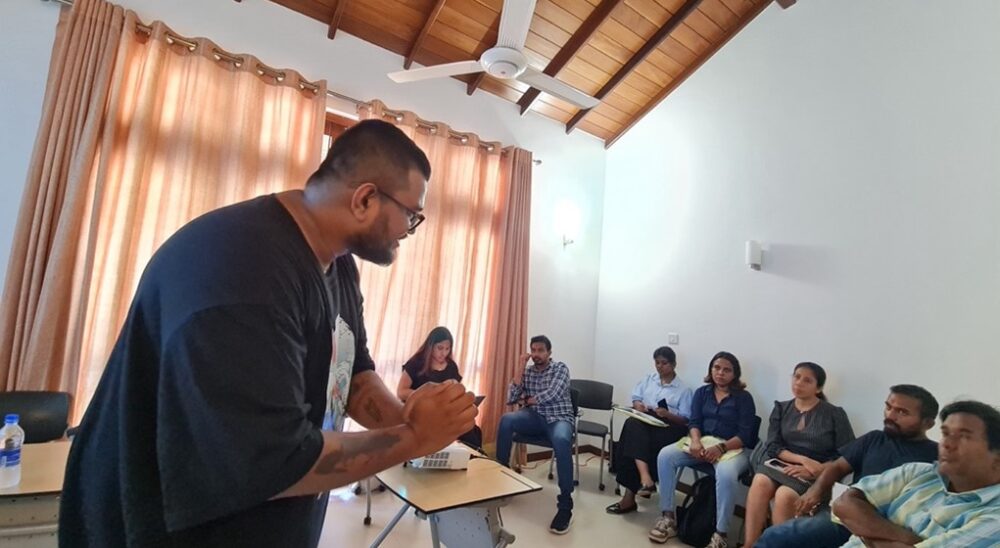
Image: This photograph is from a recently held workshop where LIRNEasia unveiled “Dissect” – a cutting-edge web tool employing advanced AI tailored for effective fact-checking. Developed by Appendix Pvt. Ltd. under Watchdog Sri Lanka, the web tool is currently being tested for effectiveness by LIRNEasia as part of a project supported through a grant from the Asia Foundation. The tool was beta-launched to a select group of Sri Lankan journalists and fact-checkers. Read more about the workshop here.
by LIRNEasia Research Team: Helani Galpaya, Gayashi Jayasinghe, Ramathi Bandaranayake, Azamat Ababakirov, and Ruwanka de Silva
LIRNEasia studied information disorder in Asia for a scoping study on challenges of information disorder in the Global South in 2022[1]. We conducted over 80 key informant interviews, including fact checkers and journalist to gather data for the study. Fact checkers and journalists talked about use of digital tools, including AI tools in their day-to-day work. Some of their Digital tools included ‘the Social-People Index, Facebook Ad Library, Crowd Tangle, Sentione, Google fact-check tool, Claim Buster, and TinEye’. In another project funded by the Asia Foundation we explored Fact-checkers’ willingness to use AI tools in their fact-checking process. Fact checkers explained how AI can be integrated to their work, what do they expect from an AI tool, and challenges of using AI. We explored this because the quantity and speed of information creation and spread is at time difficult for humans to keep up with. Often, a viral (and untrue) story is noticed by fact checkers only after it has already gone vital. As such, use of tools might help not just identify content that is false, but also identify false content before they cause harm.
- Integration of AI in Fact-Checking
Incorporating AI into fact-checking processes can greatly enhance the speed and accuracy of verifying information. Fact-checkers currently use a broad array of digital tools, and integrating AI into these tools is seen as crucial for maintaining operational effectiveness without disrupting current workflows. As the volume and complexity of misinformation increase with the expanding reach of the internet, fact-checking organizations are struggling to keep up. One fact-checker highlighted, “AI can significantly speed up the fact-checking process, which is vital when misinformation spreads far quicker than we can manually handle.” This illustrates the potential of AI to streamline the verification of vast amounts of information efficiently.
- Expectations from AI
The adoption of AI in fact-checking is not just about technological enhancement but also involves overcoming operational and organizational hurdles, such as limited resources, the need for continuous funding, and fostering collaborative efforts within the fact-checking community. Fact-checking tools must be designed to meet the unique challenges of different regions, including adaptation to local misinformation trends and languages. “For AI deployment in fact-checking to be successful, the tools must be tailored to the unique challenges faced in different regions” stated a fact-checker. Training is crucial to ensure that fact-checkers can effectively utilize these AI tools and to address any concerns about the reliability and implications of automation. Moreover, the study emphasizes the importance of “pre-bunking,” where misinformation is countered proactively before it gains traction, a strategy that can be significantly enhanced by AI.
- Challenges of Using AI
Integrating AI into fact-checking workflows involves several challenges. Training AI systems to effectively process local languages and understand cultural subtleties is a significant hurdle, especially in linguistically diverse regions like Bangladesh and Sri Lanka. Transparency in AI decision-making processes is also a major concern for fact-checkers, as the reasoning behind AI conclusions must be clear to maintain public trust. “AI enhances the speed and consistency of fact-checking, but it struggles with the complexity and contextual understanding necessary to tackle misinformation effectively” explained a fact-checker. Additionally, while AI can rapidly identify patterns and inconsistencies, the depth and breadth of human understanding are still required for dealing with complex issues that necessitate cultural context or expert interpretation.
From other research, we know one of the main challenges is around language resources (e.g. language corpora) and data. Language resources are lacking for minority languages and without these natural language processing algorithms cannot operate. In addition, to “fact check” we also need facts – and open, accessible, machine-readable data sets are scarce in the majority world/global south.
Despite these obstacles, there is a cautious optimism about the role of AI in the future of fact-checking. “AI is not a replacement for human fact-checkers but a powerful ally that can help us manage the overwhelming flow of information” remarked another fact-checker optimistically. The successful implementation of AI in fact-checking necessitates an ongoing dialogue between AI developers and fact-checking organizations to refine the technology and ensure it meets the frontline needs in the fight against misinformation.



